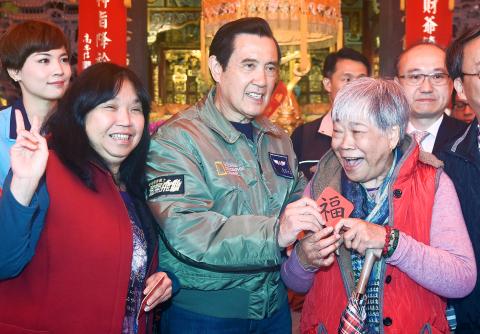With the new legislative session beginning today, the Democratic Progressive Party (DPP) caucus yesterday listed as priorities amendments that would significantly extend the prohibition period for visits to China by former presidents, vice presidents, generals and political appointees.
The caucus’ draft amendment to the Classified National Security Information Protection Act (國家機密保護法) seeks to extend the prohibition period for retired presidents and vice presidents from three years after their retirement to six years, while a draft amendment to the Act Governing Relations Between the People of the Taiwan Area and the Mainland Area (台灣地區與大陸地區人民關係條例) aims to extend the period during which retired generals are barred from visiting China.
The DPP caucus’ prioritization of the bills for review drew protest from former president Ma Ying-jeou (馬英九), who last month said that he did not rule out visiting China after his three-year ban is lifted on May 20.

Photo: Liao Chen-huei, Taipei Times
Ma’s office yesterday issued a statement criticizing the DPP, saying that attempting to push through the “unconstitutional” amendments was politicking, would aggravate ideological conflicts and would neglect legislation related to energy and people’s livelihoods.
Chinese Nationalist Party (KMT) Chairman Wu Den-yih (吳敦義) also blasted the plans to extend the prohibition periods for former officials, saying that they contravene the basic legal principle of respecting precedent and avoiding ex post facto lawmaking.
Arbitrarily lengthening the travel ban would set a bad example for following administrations, he said.
“If they do whatever they want, who is to say that the KMT will not lengthen the ban to 30 years for former officials?” Wu said.
DPP caucus director-general Lee Chun-yi (李俊俋) denied that the proposed amendments target Ma and Wu, saying that they were designed to prevent the leaking of state secrets, such as the case of former army general Lo Hsien-che (羅賢哲), who was convicted for leaking military secrets to China from 2004 to 2011.
It is not certain that the amendments would be passed before May 20, he said.
Separately yesterday, when asked for comment on the prioritization of the bills and the intent of such a move, Executive Yuan spokeswoman Kolas Yotaka said that the Cabinet would finalize its list of priority legislation after a meeting with DPP lawmakers on Monday next week.
The content of the Cabinet’s draft amendments to the two acts largely coincides with that of the caucus’ proposals, she said.
The Executive Yuan has drafted its own amendments because “national security allows no compromise,” she added.
Additional reporting by Jonathan Chin

SECURITY: As China is ‘reshaping’ Hong Kong’s population, Taiwan must raise the eligibility threshold for applications from Hong Kongers, Chiu Chui-cheng said When Hong Kong and Macau citizens apply for residency in Taiwan, it would be under a new category that includes a “national security observation period,” Mainland Affairs Council (MAC) Minister Chiu Chui-cheng (邱垂正) said yesterday. President William Lai (賴清德) on March 13 announced 17 strategies to counter China’s aggression toward Taiwan, including incorporating national security considerations into the review process for residency applications from Hong Kong and Macau citizens. The situation in Hong Kong is constantly changing, Chiu said to media yesterday on the sidelines of the Taipei Technology Run hosted by the Taipei Neihu Technology Park Development Association. With

CARROT AND STICK: While unrelenting in its military threats, China attracted nearly 40,000 Taiwanese to over 400 business events last year Nearly 40,000 Taiwanese last year joined industry events in China, such as conferences and trade fairs, supported by the Chinese government, a study showed yesterday, as Beijing ramps up a charm offensive toward Taipei alongside military pressure. China has long taken a carrot-and-stick approach to Taiwan, threatening it with the prospect of military action while reaching out to those it believes are amenable to Beijing’s point of view. Taiwanese security officials are wary of what they see as Beijing’s influence campaigns to sway public opinion after Taipei and Beijing gradually resumed travel links halted by the COVID-19 pandemic, but the scale of

A US Marine Corps regiment equipped with Naval Strike Missiles (NSM) is set to participate in the upcoming Balikatan 25 exercise in the Luzon Strait, marking the system’s first-ever deployment in the Philippines. US and Philippine officials have separately confirmed that the Navy Marine Expeditionary Ship Interdiction System (NMESIS) — the mobile launch platform for the Naval Strike Missile — would take part in the joint exercise. The missiles are being deployed to “a strategic first island chain chokepoint” in the waters between Taiwan proper and the Philippines, US-based Naval News reported. “The Luzon Strait and Bashi Channel represent a critical access

Pope Francis is be laid to rest on Saturday after lying in state for three days in St Peter’s Basilica, where the faithful are expected to flock to pay their respects to history’s first Latin American pontiff. The cardinals met yesterday in the Vatican’s synod hall to chart the next steps before a conclave begins to choose Francis’ successor, as condolences poured in from around the world. According to current norms, the conclave must begin between May 5 and 10. The cardinals set the funeral for Saturday at 10am in St Peter’s Square, to be celebrated by the dean of the College